|
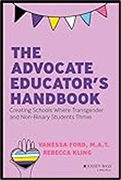 The Advocate Educator’s Handbook: Creating Schools Where Transgender and Non-Binary Students Thrive The Advocate Educator’s Handbook: Creating Schools Where Transgender and Non-Binary Students Thrive
by Vanessa Ford and Rebecca Kling
This book includes practical tools that readers can start using on day one, personal stories from its co-authors, input from both trans youth and trans adults, and model policies for teachers, schools administrators, and public policymakers. It also suggests ways to engage trans youth, and youth allies to ensure adults are advocating with youth, not simply for youth.
|
|
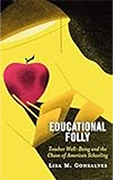 Educational Folly: Teacher Well-Being and the Chaos of American Schooling Educational Folly: Teacher Well-Being and the Chaos of American Schooling
by Lisa M. Gonsalves
Gonsalves offers a comprehensive critique of educational reforms that have eroded the teacher’s position. This leaves teachers with psychological scars – scars which are fueling the recent exodus from teaching. The author lays out a new vision for the future of education reform. This model centers around justice, community, and professionalism to return the teacher to the rightful head of the classroom and to restore dignity and progress to all of America’s schools.
|
|
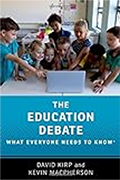 The Education Debate: What Everyone Needs to Know The Education Debate: What Everyone Needs to Know
by David Kirp and Kevin Macpherson
Nationally recognized education authority David Kirp and Kevin Macpherson provide an overview of the key policy and practice issues in pre k-12 education today. Many of the topics they address, including racial integration, charter schools, student rights and teachers’ unions, are hotly contested. A primer for educational policymakers and administrators, parents, and undergraduate and graduate students in education courses.
|
|
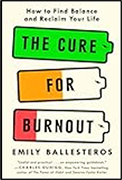 The Cure for Burnout: How to Find Balance and Reclaim Your Life The Cure for Burnout: How to Find Balance and Reclaim Your Life
by Emily Ballesteros
Ballesteros outlines five areas in which you can build healthy habits to combat burnout: mindset, personal care, time management, boundaries, and stress management. She offers clear, easy-to-implement tools to help you find greater balance, energy, and fulfillment, by showing you how to break burnout habits, create sustainable work/life balance through predictable personal care, get more done in less time, and set your personal and professional limits. Guilt-free.
|
|
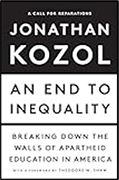 An End to Inequality: Breaking Down the Walls of Apartheid Education in America An End to Inequality: Breaking Down the Walls of Apartheid Education in America
by Jonathan Kozol
When Jonathan Kozol’s Death at an Early Age appeared in 1967, it rocked the education world. Based on the Rhodes Scholar’s first year of teaching in Boston’s Black community, the book described the abuse and neglect of children for no reason but the color of their skin. Since that National Book Award–winning volume, Kozol has spent more than fifty years visiting with children and working with their teachers in other deeply troubled and unequal public schools. Now, in the culminating work of his career, Kozol goes back into the urban schools, where racial isolation is at the highest level since he became a teacher. This is a book that points us to a future in which children learn together, across the lines of class and race, in schools where every child is accorded a full and equal share of the riches in this wealthiest of nations.
|
|
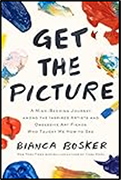 Get the Picture: A Mind-Bending Journey Among the Inspired Artists and Obsessive Art Fiends Who Taught Me How to See Get the Picture: A Mind-Bending Journey Among the Inspired Artists and Obsessive Art Fiends Who Taught Me How to See
by Bianca Bosker
The New York Times bestselling author of Cork Dork takes readers on another fascinating, hilarious, and revelatory journey that will change the way you see forever. In Get the Picture, Bosker throws herself into the nerve center of art and the people who live for it: gallerists, collectors, curators, and, of course, artists themselves.
|
|
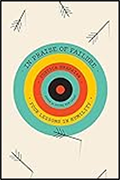 In Praise of Failure: Four Lessons in Humility In Praise of Failure: Four Lessons in Humility
by Costica Bradatan
Success is all very well, but failure teaches us what is most important: humility. Costica Bradatan tells the stories of four thinkers who, for all their external success, courted failure throughout their years. From Simone Weil to Seneca and Gandhi, the greatest of us made meaningful lives by grasping the epiphanies of failure.
|
|
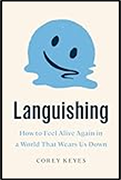 Languishing: How to Feel Alive Again in a World That Wears You Down Languishing: How to Feel Alive Again in a World That Wears You Down
by Corey Keyes
The Emory University sociologist who coined the term languishing – low-grade mental weariness that affects our self-esteem, relationships, and motivation – explores the rise of this phenomenon and presents a comprehensive guide to flourishing in a world that demands too much. Languishers are more likely to feel out of control of their lives, uncertain about what they want from the future, and paralyzed when faced with decisions. Keyes’ framework focuses on functioning well: taking simple but powerful steps to hold our emotions loosely, becoming more accepting of ourselves and others, and carving out daily moments for the activities that create cycles of meaning, connection, and personal growth.
|
|
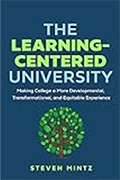 The Learning-Centered University: Making College a More Developmental, Transformational, and Equitable Experience The Learning-Centered University: Making College a More Developmental, Transformational, and Equitable Experience
by Steven Mintz
Mintz provides a thought-provoking analysis of the challenges facing higher education, from the growing disparities in resources and facilities to the need for a more holistic approach to students’ development. He offers actionable solutions to create a more interactive, engaging, and skills-focused learning environment. From seamless community college transfers to embedding career preparation throughout the undergraduate experience, Mintz steers institutions toward a future that embraces innovation and student success.
|
|
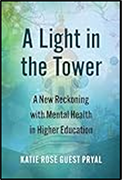 A Light in the Tower: A New Reckoning with Mental Health in Higher Education A Light in the Tower: A New Reckoning with Mental Health in Higher Education
by Katie Rose Guest Pryal
Pryal argues that the systemic crisis of mental health in higher education communities is the result of exploited and overworked contingent faculty and students, the shock events like COVID-19 and campus shootings that traumatize communities, the systemic and institutional burnout that affects higher education at every level, and the market-driven culture of toxic overwork. Pryal outlines actions that professors and administrators can take to address the problem, including: listening to and assisting students who request disability accommodations, normalizing the use of laptops, and scaffolding assignments.
|
|
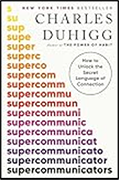 Supercommunicators: How to Unlock the Secret Language of Connection Supercommunicators: How to Unlock the Secret Language of Connection
by Charles Duhigg
Supercommunicators, Charles Duhigg argues, understand – some by intuition, some by hard-won experience – that there is a science to how human beings connect through words. They know the importance of recognizing – and then matching – each kind of conversation, and how to hear the complex emotions, subtle negotiations and hidden beliefs that color and inform everything we say.
|
|
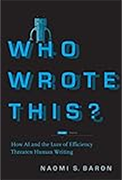 Who Wrote This?: How AI and the Lure of Efficiency Threaten Human Writing Who Wrote This?: How AI and the Lure of Efficiency Threaten Human Writing
by Naomi S. Baron
To understand how AI is redefining what it means to write and think, linguist and educator Naomi Baron connects the dots between human literacy and today’s technology. As the technology becomes increasingly sophisticated and fluent, it’s tempting to take the easy way out and let AI do the work for us. As AI plies us with suggestions or full-blown text, we risk losing not just our technical skills but the power of writing as a springboard for personal reflection and unique expression. Funny, informed, and conversational, Who Wrote This? urges us to make conscious choices about the extent to which we collaborate with AI.
|
|
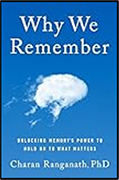 Why We Remember: Unlocking Memory’s Power to Hold on to What Matters Why We Remember: Unlocking Memory’s Power to Hold on to What Matters
by Charan Ranganath
Memory is far more than a record of the past. In this groundbreaking tour of the mind and brain, one of the world’s top memory researchers reveals the powerful role memory plays in nearly every aspect of our lives, from recalling faces and names, to learning, decision-making, trauma and healing. When we work with the brain’s ability to learn and reinterpret past events, we can shed our biases, learn faster, and grow in self-awareness.
|

 The Advocate Educator’s Handbook: Creating Schools Where Transgender and Non-Binary Students Thrive
The Advocate Educator’s Handbook: Creating Schools Where Transgender and Non-Binary Students Thrive  Educational Folly: Teacher Well-Being and the Chaos of American Schooling
Educational Folly: Teacher Well-Being and the Chaos of American Schooling  The Education Debate: What Everyone Needs to Know
The Education Debate: What Everyone Needs to Know  The Cure for Burnout: How to Find Balance and Reclaim Your Life
The Cure for Burnout: How to Find Balance and Reclaim Your Life  An End to Inequality: Breaking Down the Walls of Apartheid Education in America
An End to Inequality: Breaking Down the Walls of Apartheid Education in America  Get the Picture: A Mind-Bending Journey Among the Inspired Artists and Obsessive Art Fiends Who Taught Me How to See
Get the Picture: A Mind-Bending Journey Among the Inspired Artists and Obsessive Art Fiends Who Taught Me How to See  In Praise of Failure: Four Lessons in Humility
In Praise of Failure: Four Lessons in Humility  Languishing: How to Feel Alive Again in a World That Wears You Down
Languishing: How to Feel Alive Again in a World That Wears You Down  The Learning-Centered University: Making College a More Developmental, Transformational, and Equitable Experience
The Learning-Centered University: Making College a More Developmental, Transformational, and Equitable Experience  A Light in the Tower: A New Reckoning with Mental Health in Higher Education
A Light in the Tower: A New Reckoning with Mental Health in Higher Education  Supercommunicators: How to Unlock the Secret Language of Connection
Supercommunicators: How to Unlock the Secret Language of Connection  Who Wrote This?: How AI and the Lure of Efficiency Threaten Human Writing
Who Wrote This?: How AI and the Lure of Efficiency Threaten Human Writing  Why We Remember: Unlocking Memory’s Power to Hold on to What Matters
Why We Remember: Unlocking Memory’s Power to Hold on to What Matters